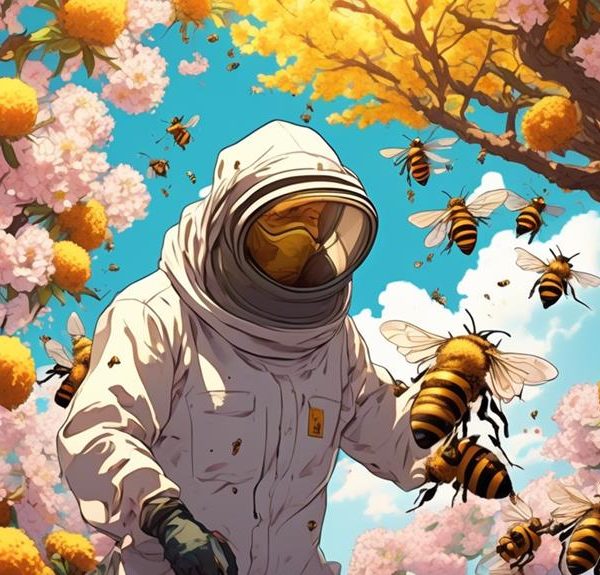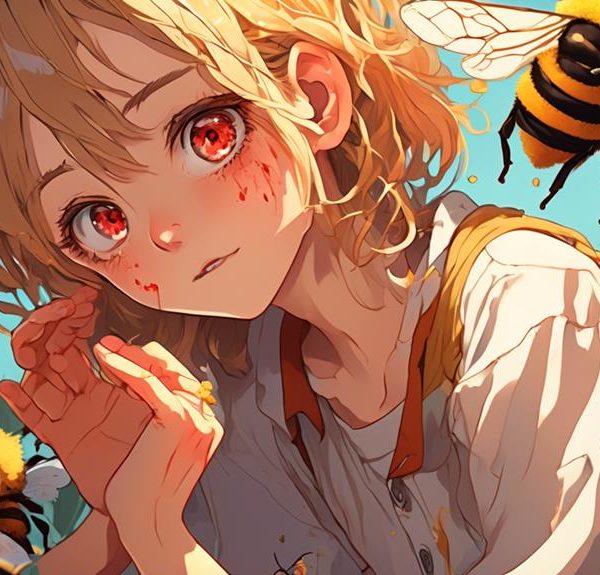Through huddling, vibrating and clever honey rationing, discover the extraordinary strategies bees use to survive the cold winter months.

Can Bees Survive in the Cold?
Much like the fabled ants in Aesop's tale, bees don't simply surrender to the oncoming cold, they actually prepare. You'd think that these tiny, buzzing creatures would succumb to winter's icy grip, but surprisingly, bees have evolved a number of remarkable strategies to endure the coldest months.
You'd be fascinated to uncover how these industrious insects huddle and vibrate to generate warmth, how the queen's role becomes pivotal, and how they ration their honey to survive. But wouldn't you want to know more about their winter survival strategies, and perhaps, how we could help them thrive?
We're just warming up.
Key Takeaways
- Bees have various strategies to survive in the cold, such as forming a tight cluster, stockpiling honey, and sealing their hives with propolis.
- The queen bee plays a crucial role in winter survival as she conserves energy and is kept warm by the worker bees.
- Cold weather can have negative impacts on bee populations, including compromising their thermoregulation process, depleting their food reserves, and weakening their immune systems.
- There are ways to help bees survive the cold, such as providing food and water sources, creating shelter, and limiting pesticide use.
Understanding Bee Behavior in Winter
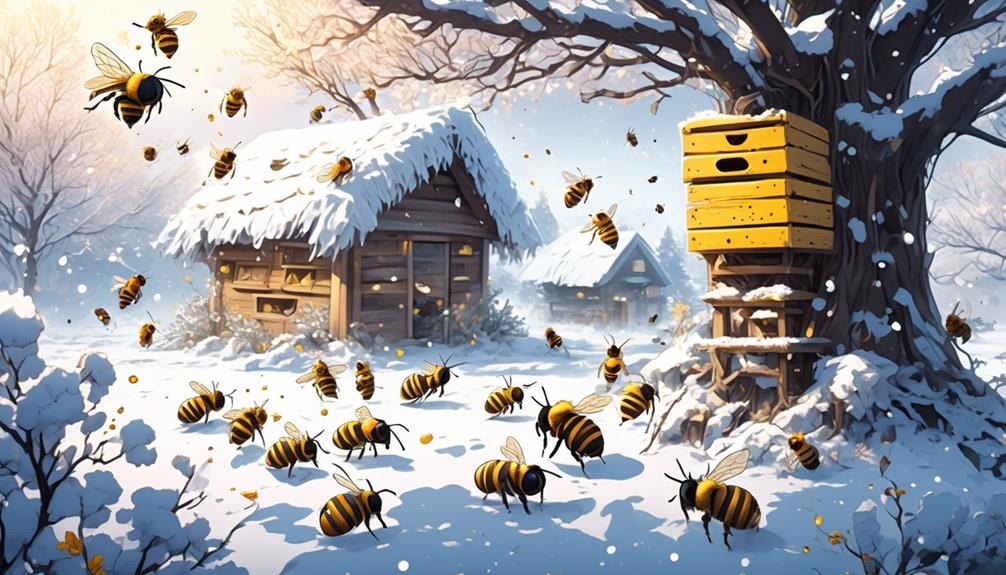
Diving into the winter behavior of bees, it's crucial to understand that these industrious insects don't hibernate, but rather engage in a series of survival strategies to endure the cold months. They form what's known as a winter cluster, a tightly packed huddle of bodies, with the queen bee at the center, while worker bees rotate from the cluster's chilly exterior to its warm interior. This constant rotation ensures every bee stays warm and alive.
As a survival mechanism, bees also produce honey. They store it in honeycombs, their natural pantry, and consume it throughout the winter to generate heat and maintain the temperature inside the hive. They meticulously regulate their honey consumption, ensuring it lasts till spring when nectar is available again.
Another fascinating aspect is their ability to live longer during winter. A worker bee's lifespan extends to several months from the usual six weeks, a biological adaptation to ensure colony survival. In essence, bees exhibit remarkable resilience and adaptability in winter, employing a mix of behavioral and physiological strategies to survive the harsh conditions.
Your understanding of these mechanisms is essential to appreciate their role in ecosystem preservation.
How Bees Prepare for Cold Weather
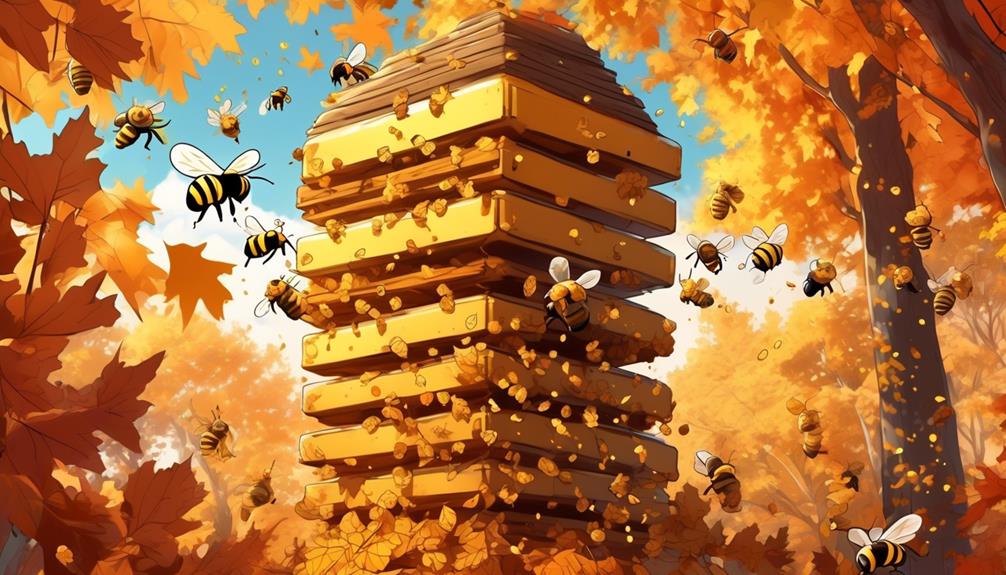
Before the biting cold of winter sets in, bees meticulously prepare themselves, following a series of strategic steps aimed at ensuring their survival. You might be surprised to learn the lengths these fascinating insects go to for their preservation.
To help you understand better, let's delve into the preparatory measures in a more structured manner:
Actions by Bees | Purpose |
|---|---|
Gathering nectar and pollen | To store food for the non-foraging winter months |
Sealing the hive with propolis | To insulate and protect the hive from harsh conditions |
Forming a tight cluster | To generate and conserve heat |
These bees don't just gather food; they turn into industrious hoarders, collecting as much nectar and pollen as they can. They then seal their hive with propolis, a resinous substance, to insulate it against the cold. As temperatures drop, they form a tight cluster, their bodies generating heat to keep the hive warm. It's a marvel of nature, how these tiny creatures can adapt to survive harsh conditions. Their preparation for winter is a testament to the resilience and tenacity inherent in their species.
The Role of the Queen Bee During Winter
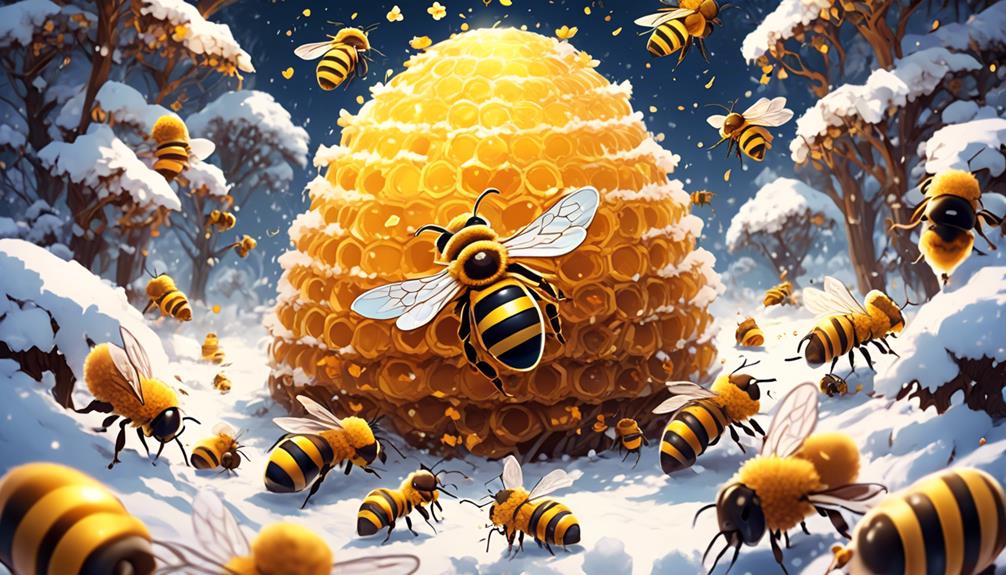
While the worker bees are busy securing the hive's survival, the queen bee plays a pivotal role in ensuring the continuity of the colony during the harsh winter months. Her primary function is reproduction, but during the winter, she isn't laying eggs. Instead, she's preparing for the coming spring by staying warm and nourished, preserving her energy for the egg-laying season ahead.
The worker bees, loyal to their queen, form what's known as a 'winter cluster' around her. They vibrate their bodies, generating heat that's essential for the queen's survival. They'll even sacrifice themselves for her, heading out into the cold to gather food, knowing they mightn't return.
The queen's survival is paramount as without her, there's no future for the hive. She's the key to the colony's resurgence in the spring, ready to lay thousands of eggs to replenish the hive. So, you see, the queen bee doesn't just survive the winter; she prepares, conserves, and waits, ensuring the continuity of the colony.
Understanding her role sheds light on the complex and astonishing dynamics of bee society, especially during winter.
Survival Strategies of Bees in Winter
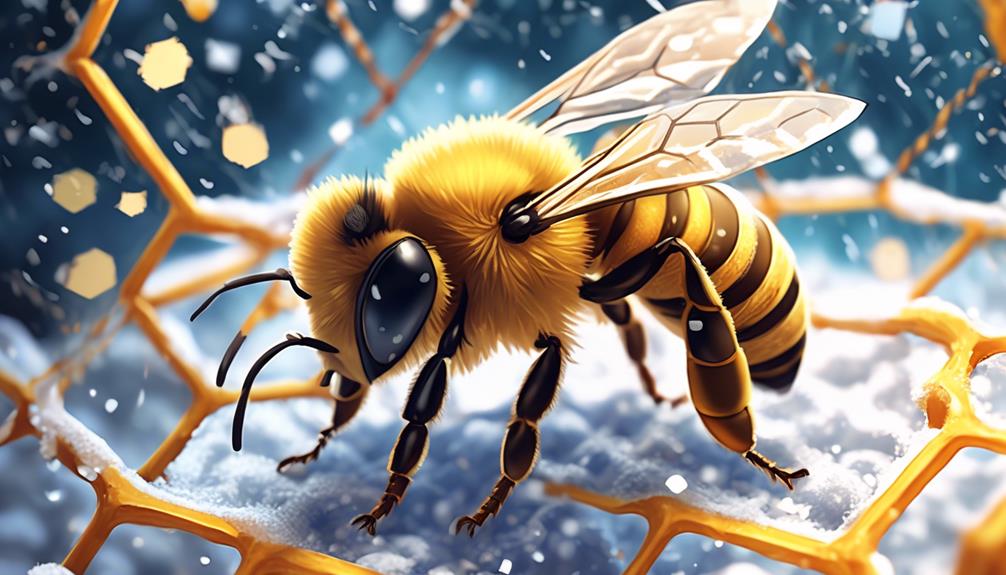
In the face of winter's harsh conditions, bees employ a variety of survival strategies, underscoring their resilience and adaptability. You might think these tiny creatures would succumb to freezing temperatures, but they've evolved remarkable tactics to endure the cold season.
Firstly, bees stay warm by forming a tight cluster within their hive. They use their body heat to maintain a consistent temperature at the core of the cluster, ensuring the survival of the queen and the young. It's a tactic akin to penguins huddling together in the Antarctic.
Secondly, bees stockpile honey in the warmer months. They're diligent workers, and they know they'll need food reserves when flowers aren't blooming. They survive on this stored honey throughout the winter, rationing to make sure it lasts.
Lastly, bees seal their hives with propolis, a resinous substance they collect from tree buds. It acts as both insulation and protection, keeping the heat in and invaders out.
These strategies aren't merely about survival, but about ensuring the continuation of the colony. It's a testament to the bees' industrious nature and their impressive adaptability.
The Impact of Cold Weather on Bee Populations
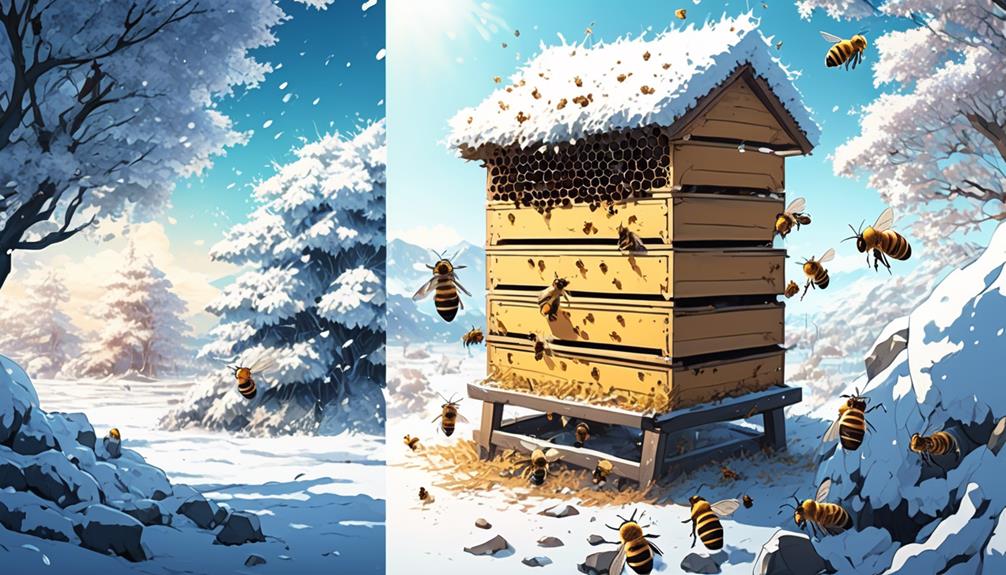
Despite the bees' innovative survival strategies, cold weather still poses significant challenges and can have dramatic impacts on their populations. You must understand that bees, especially honeybees, aren't designed to endure freezing temperatures. During winter, bees huddle together in their hives to generate heat, a process known as 'thermoregulation'. However, if the temperatures drop drastically, it can compromise this process, causing the bees to freeze to death.
Extreme cold temperatures can also directly affect the bees' food supplies. Bees store honey to survive the winter months when flowers aren't blooming. If the winter is too harsh and long, bees may exhaust their food reserves before spring arrives, leading to starvation.
Furthermore, cold weather can trap bees inside their hives for extended periods. This can lead to a buildup of waste inside the hive, making it a breeding ground for diseases. The prolonged confinement can also stress the bees, weakening their immune systems and making them more susceptible to illnesses.
Ways to Help Bees Survive the Cold
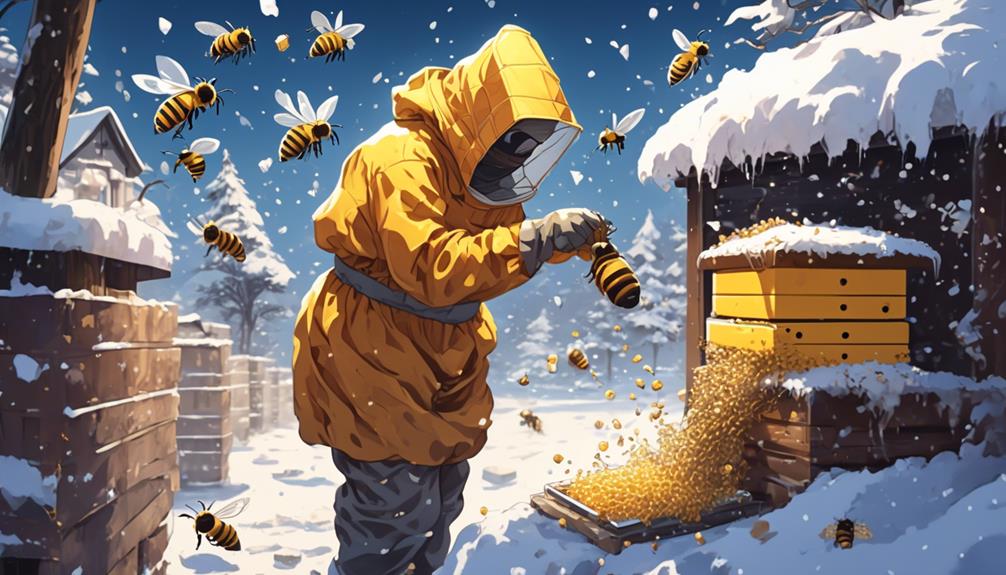
So, how can you help bees weather the cold and increase their chances of survival during the winter months? It's simpler than you might think, and it involves some practical steps that can make a world of difference to these vital pollinators.
Firstly, it's essential to provide food and water. Bees need a constant energy source to maintain body temperature and survive. You can leave out sugar water or set up a bee feeder filled with honey or pollen supplements.
Secondly, consider providing shelter. A small, insulated bee house in your garden can offer a cozy refuge from harsh weather conditions.
However, the most impactful step you can take is to limit pesticide use. Pesticides weaken bees' immune systems, making them more susceptible to diseases and less able to withstand cold.
Here's a quick guide to help you get started:
Action | Impact |
|---|---|
Providing food and water | Keeps bees energized and helps maintain body temperature |
Building a bee house | Offers shelter from harsh weather conditions |
Limiting pesticide use | Strengthens bees' immune system and increases resilience to cold |
Frequently Asked Questions
How Does the Change in Temperature Affect the Bees' Food Sources?
When temperatures drop, the food sources for bees diminish significantly. Flowers aren't blooming and nectar is scarce. You'll find that bees have to rely on the honey they've stored during warmer months. If they haven't stored enough, they could starve.
Do Bees Migrate to Warmer Regions During Winter?
You might think bees would flee to warmer climates when winter hits, but they don't. Instead, bees huddle together in their hive, creating a winter cluster. The queen bee sits at the center, with worker bees surrounding her. They shiver their bodies, generating heat and keeping the hive warm.
What Are the Common Diseases That Bees May Get During the Cold Season?
You're wondering about common diseases that bees get during the cold season.
Well, Nosema disease, a fungal infection, often strikes in colder months. It impairs their ability to process food and can lead to death.
Another threat is Varroa mites, parasites that can weaken bees and spread viruses.
Cold weather can exacerbate these issues, as the bees are already struggling with the challenges of winter.
How Does a Bee's Lifespan Change in Cold Weather?
In cold weather, a bee's lifespan can indeed change. Typically, bees live longer in the winter than in the summer.
You might think it's due to less activity, but it's actually because winter bees have a larger 'fat body'. This allows them to store more nutrients, enhancing their survival during months when nectar is scarce.
How Does the Cold Weather Affect the Bees' Ability to Pollinate?
Cold weather does affect bees' ability to pollinate. Bees need warmth to fly, so when it's cold, they can't venture out to collect nectar or spread pollen. In extreme cold, they'll cluster in the hive to stay warm. That's why you'll see less bee activity in winter.
However, some bee species have adapted to cold climates and can pollinate during cooler temperatures, although it's not the norm.
Conclusion
So, can bees survive in the cold? Absolutely! They're remarkably adapted to endure winter, with preparation strategies and a strong queen leading the way.
However, harsh winters can impact their populations significantly. You can help by providing food and shelter, aiding these essential pollinators in braving the cold.
Remember, their survival isn't just critical for them, but for our ecosystems too. Let's do our part to support these amazing creatures!

